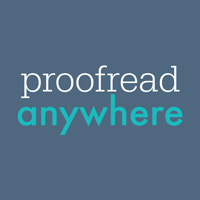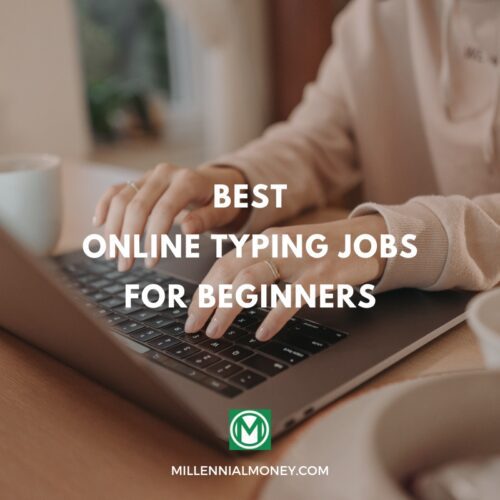An online proofreading job can seem like an attractive option if you’ve got a good command of the English language, enjoy reading, and need a stay-at-home job. For a lot of people, the conditions are ideal.
Minimal financial investment is needed, qualifications aren’t necessarily required, and the work is flexible. Online proofreading is something you can do whenever and wherever you want.
Whether you’re a stay-at-home parent or living the digital nomad lifestyle, working remotely from your computer can be a great option. Online proofreading jobs generally revolve around projects and deadlines rather than set hours, so it’s easy to structure the work around your routine.
As the internet continues to expand, more new content is being created every day. All this content needs to be proofread – there’s never been a better time to become a proofreader. Yet making a start on something new can be daunting. Where can you find a job? Is it competitive? How much money can you make proofreading?
This guide to online proofreading jobs will answer these questions and more.
What Is Proofreading?
Before we get started, let’s define what proofreading is and isn’t.
Proofreading is the final stage of the editing process, which takes place once the first draft has been written and run through by an editor. Proofreaders are the last in line before a piece of work is published.
Proofreading vs. Editing
Proofreaders focus on spelling and grammar mistakes. They don’t suggest large changes such as rephrasing sentences, restructuring, or formatting entire sections – this is the job of copy editors.
When searching for online proofreading jobs, you’ll find there’s a lot of overlap between editors and proofreaders when it comes to job adverts. It’s important to be aware of the differences.
Proofreaders cover a wide variety of content. The usual suspects are the types already alluded to – eBooks and web content – but it doesn’t end there. More under-the-radar documents also need to be proofread: white papers, student theses, user manuals; even menus.
It’s also important to differentiate between being a remote employee and a freelancer. Both involve very similar job tasks, but the structure couldn’t be more difficult. Freelancers are responsible for managing their own freelance business and finding clients, whereas employees work for one company. Both options offer the flexibility of working from home.
Best Proofreading Jobs Online
Here are the top 10 ways to find proofreading jobs online:
FlexJobs
FlexJobs specializes in remote job opportunities; seriously, that’s all they do.
You can find both part-time and full-time jobs that allow you to work from home, or anywhere in the world for that matter.
Fiverr
Another popular option is Fiverr, which has the advantage of letting you get started straight away. This makes it an ideal place to test the waters and see what types of assignments you like doing.
Fiverr started as a website where you could find anyone to do anything for $5, but has quickly evolved to be one of the top platforms in the world for freelancers to find work and people to find freelancers. It’s definitely worth exploring.
It also makes it easy to do a few assignments and use your happy clients as testimonials in other areas of your proofreading business.
Learn more:
UpWork
If you don’t feel ready to pitch directly to companies, using third-party websites designed for freelancers could be a good option.
The advantage of using these kinds of sites is that you don’t have to worry about being scammed or chasing payment because the website takes care of this for you. However, it comes at a price – a cut of the profit will be taken.
Upwork is the largest and most popular of these websites, and it provides a huge amount of work. Some love it and others hate it, but it can be a good place to start.
However, it can be complicated to get accepted as Upwork claims to receive over 10,000 applicants a day. You need to ensure that your profile is filled in and you include all relevant information.
Learn more:
LinkedIn is a well-respected place to search for high-quality jobs. You can input ‘remote’ into the location option to ensure that you narrow your search down to online proofreading jobs.
It’s also possible to create alerts for jobs that match your search terms and have new jobs sent straight to your inbox daily. Just remember to create multiple alerts including all the key terms.
Indeed
You’ve probably used Indeed before, but not everybody realizes the number of remote jobs on there.
Competition can be high since Indeed is one of the most well-known job websites in the world and it’s extremely convenient to use – but for the same reasons, you can’t afford to ignore it.
Monster
Another great option is Monster.com, which works in almost the same way as Indeed. Regularly applying for relevant jobs posted on this triad – LinkedIn, Indeed, and Monster – will certainly keep you occupied.
Hopefully, success will come your way eventually.
Online Proofreading Job Boards
The final option you can pursue is to check online job boards and websites that are specifically made for freelance proofreading jobs.
Some big online job boards which often have jobs relevant for proofreading are these:
- JournalismJobs – best for ‘media jobs’ including proofreading
- ProBlogger – mostly for writing jobs but sometimes proofreading
- BloggingPro – aimed at writers but includes proofreading too
- MediaBistro – various media jobs including proofreading
11 Proofreading Jobs That Require A Degree
There are also various websites that are specifically geared toward experienced proofreaders. These sites are looking for highly qualified academic proofreaders.
For those professional jobseekers, here are the 11 best proofreading jobs that require a degree:
- CACTUS Global – needs proofreaders to have a PhD/Master’s/Bachelor’s degree or expertise in a specialized subject.
- Edit 911 – hires proofreaders with an English PhD who can use InDesign or Publisher.
- Edit Fast – requires a degree from a recognized university.
- Enago – hires proofreaders with a Master’s degree/PhD/postdoctoral research experience.
- English Trackers – hires proofreaders with a PhD.
- ProofreadingPal – hires proofreaders enrolled in college with a minimum 3.5 GPA or experienced graduates.
- Scribbr – hires proofreaders with a Bachelor’s degree.
- Scribendi – hires editors with a university degree.
- WordFirm Inc’s ManagedEditing prefers five years’ experience and a degree.
- Words R U – hires proofreaders with a PhD or Master’s and preferably with ESL experience.
- Wordvice – requires a graduate degree.
19 Proofreading Jobs for Beginners
If you are just getting started as a proofreader, here are the top 19 online proofreading jobs that don’t require a degree:
- American Journal Experts – hires editors with proven expertise.
- Babbletype – hires skilled proofreaders and editors.
- Domainite – the rates are low but could be a good place to start.
- Book Editing Associates – five years of experience is required.
- Editor Live – hires proofreaders for academic and business papers.
- Gramlee – must submit an application to get approved.
- Kibin – allows you to sign up for proofreader job alerts.
- Kirkus Media – sometimes hires editors.
- Lifetips – offer remote employee positions with benefits.
- OneSpace – hire for both writing and editing jobs.
- Polished Paper – hires those who can pass a 35-question test.
- Prompt – hires freelancers to read college admission essays.
- Proofreadingservices.com – hires those who can pass a 20-minute proofreading test.
- R3ciprocity –based on a credits system where contributors proof each other’s work and use the credits to get their own work proofed. You can also turn the credits into cash.
- Reedsy – a freelance marketplace that allows you to work with authors and writers.
- Scribe Media – hire freelance “scribes.” The role involves writing as well as editing.
- Scribe Writing (previously Book in a Box) – proofread a book project which lasts for a series of months.
- Smartbrief – sometimes looks for proofreaders and editors but the pay is low.
- Writer’s Relief – hires proofreaders to read the work of creative writers to get published. Only accept 2% of those who apply to get accepted.
Connect With Proofreaders in Facebook Groups
Facebook groups are another great way to find jobs. Many companies aren’t willing to spend their budget on giving commission to third-party websites and prefer to directly source proofreaders. However, it’s worth exercising a healthy dose of caution when it comes to Facebook job pages; they can sometimes be a hotspot for scammers.
One thing you may find is that proofreading jobs get posted on groups that aren’t necessarily specific to proofreading. Therefore, it’s worth getting creative with which groups you join. You should be able to find relevant jobs by searching for all the key terms related to proofreading and also terms such as ‘freelance writing’, ‘flexible jobs’, and ‘remote work’.
Clearly, there are many social media platforms you can use to source online proofreading jobs. You may want to try out various different methods and figure out which ones work out best for you. It’s important to remember that you may find your search difficult at first but things will get easier as you build up experience and get referred by past clients.
How To Become A Proofreader
It goes without saying that proofreaders need to have excellent spelling and grammar skills.
However, even if your command of the English language is perfect and your attention to detail is second-to-none, this is unlikely to guarantee you a top-paying gig unless you can back your skills up with experience or qualifications.
Do I Need A Degree To Become A Proofreader?
Having a degree in English or Journalism isn’t essential, but it’s undoubtedly an advantage. This is especially true for anybody hoping to go down the route of being a remote employee rather than a freelancer – companies will expect a more traditional candidate.
If you don’t have a degree in a relevant discipline – or no degree at all – then there’s no need to panic. Freelancing jobs tend to rely more heavily on experience and testimonials than on conventional qualifications.
Is Proofreading Difficult?
You may be worried that, since online proofreading jobs being such an attractive option for many people, the market would be oversaturated and demand would struggle to meet supply. Luckily, this doesn’t seem to be the case.
The truth is that not everybody has the skills necessary to be a good proofreader. It’s a difficult and highly technical job, which is why so many companies demand candidates who have a bachelor’s degree – or even a PhD – in English.
Due to online proofreading being such a flexible role, many people drift in and out of the profession, meaning that companies are always seeking new people.
You may also be worried about the threat of automation, especially as the use of tools such as Grammarly is growing. However, anybody who uses these tools on a regular basis knows that they’re an imperfect replacement for real human beings.
Robots may do a good job of learning grammar rules and spellings, but they’re yet to be able to understand context and tone.
Take An Online Proofreading Course for Professional Certification
If you want to brush up on your skills or stand out from your competitors, one option is to take an online course. This is a lot cheaper and quicker than completing an entire undergraduate degree.
The Proofread Anywhere course is excellent for those who want to get serious about proofreading, and you can take part in a free workshop before you decide whether to complete the whole course.
Proofread Anywhere is hands down the best proofreading course anywhere online. Hundreds of Millennial Money readers have taken this course and are now making money proofreading.
Test Your Proofreading Skills
You may be asked to do an editing test before you’re given a job, especially if you’re applying for a remote employee role, so it’s important to make sure you’re up to a good standard. Not sure whether your skills are good enough?
There are various free tests you can try, such as the Ultimate Editing Test from ProEdit or the proofreading test on Web Done Right. The Society for Editors and Proofreaders in the UK also has a test – but beware of the differences between American English and British English.
How Much Do Online Proofreaders Make Per Hour?
Online proofreading jobs aren’t usually paid by the hour. Remote employees will be paid a yearly salary, but freelance proofreaders are more likely to be paid by the project, pages, or even words.
Having said that, according to Salary.com, the average salary is $54,956. The true figure depends on a lot of factors. Payscale.com allows you to input your city and years of experience to find out a more accurate figure.
How To Choose Your Rate As A Freelance Proofreader
Of course, if you want to work as a freelance proofreader, then you’ll be free to choose your own rate. Most freelance proofreaders start off with a relatively low hourly wage and then increase their rate gradually over time as they hone their craft and build up their portfolio.
A quick search on Upwork reveals that there are currently over 200 freelance proofreaders who are charging an hourly rate of $60 an hour or more. Some charge up to $100 or even slightly more.
It’s tempting to charge a low rate under the guise that this will guarantee more work, but this isn’t the case. Most freelancers charging high rates have no trouble finding work because they have the experience and skills to back up the prices they ask for.
Best Proofreading Industries
It’s also notable that some industries are more well-paid than others. You may want to bear this in mind if you’re planning on approaching companies you’d like to work with directly. According to Data USA, the best- and worst-paying industries are as follows.
Best-paying:
- Printing & related support activities
- Legal services
- Advertising, public relations & related services
Worst-paying:
- Business support services
- Newspaper publishers
- Colleges, universities & professional schools
Tools & Online Resources For Proofreaders
In terms of equipment, online proofreading jobs have lower startup costs than many other potential businesses. Of course, you’ll need some kind of device to work from, but it doesn’t necessarily have to be a computer or laptop – a tablet is usually sufficient.
Likewise, although you’ll need an internet connection, ultra-fast internet isn’t strictly necessary since you’ll be working from text files. If your Wifi isn’t always reliable, this will come as a huge relief.
Understanding Citation Systems
It’s also extremely useful to have an understanding of the major citation systems, such as APA, MLA, and CMOS. There are plenty of resources available online that you can use to familiarize yourself with these styles, and it’s also possible to buy an official handbook directly from the websites.
Best Grammar Tools
Grammar tools such as Grammarly and Hemingway app are also incredibly helpful. This software isn’t a replacement for human proofreaders, but they do add an extra layer of security against simple errors and typos.
Grammarly offers a free version to help you avoid basic grammatical errors and a premium version that covers more sophisticated errors.
Hemingway app has no free version, but many writers swear by it. Grammar-checking apps aren’t strictly necessary when you first start on your freelancing journey, but they’re a worthwhile investment for anyone looking to grow their business further.
Best Proofreading Software
Most of the time, if you’re freelancing then simple software like Microsoft Word and Google Docs will be used. It may sound basic, but it’s a great way for clients to collaborate and see what you’re doing.
However, it may also be helpful to know how to use professional publishing software – especially if you plan on becoming a remote employee rather than a freelancer. Here are some you may come across, depending on your industry:
- Adobe Acrobat Vs 8 (Professional) for editing PDFs
- Adobe InDesign
- Adobe Framemaker
- DITA and Arbortext Editor
- QuarkXPress
- Final Draft
- iAnnnotate
- LATEX
- Publisher
- Movie Magic Screenwriter
Proofreading Business Requirements
If you want to be a freelancer, there are some additional considerations you wouldn’t need to think about if you were pursuing a more traditional job route.
You may want to purchase General Liability Insurance, preparing an invoice template, or using accounting software such as QuickBooks. Doing this will protect you against any issues that could arise and ensure that you stay on top of your clients.
This isn’t something you need to worry about when you’re first testing the waters, but it’s something you need to consider for later down the line. Remember, when you freelance, you’re essentially starting and operating your own business.
Work Samples and Testimonials
It’s also incredibly helpful to have a sample to show to clients. You can create a Google Doc of a document you proofread and clearly show the errors you picked up by highlighting them.
If you don’t have a past client then don’t worry – you can just create one using a piece of work you wrote yourself.
In addition to a sample, testimonials from previous clients go a long way in proving that you know what you’re doing. It’s possible to get started without any experience, but if you have any past clients you can call upon to recommend you, asking them is a must.
You’ll also need to have the time management skills necessary to meet deadlines, as this is a vital part of the job. When you’re working from home, there’s no boss present to motivate you.
Are Proofreaders in Demand?
We’re living in a world of content, and the content level we’re currently experiencing probably is yet to reach its peak. As independent authors and the self-publishing industry boom, many writers are looking for freelance proofreaders they can work with.
There is also more web content than ever before as more blogs are created and more businesses go digital. Now is a great time to be a proofreader.
According to Data USA, around 9,800 people in the US workforce were employed as proofreaders in 2020 – roughly the same as 2019.
The average national salary for proofreaders according to DataUSA is around $38,500 per year.
On Indeed, there are 375 ‘proofreader’ jobs posted currently. This may be less than other professions, but it’s still a considerable number.
On Upwork, there are over 3,000 jobs posted most days, which reflects that there’s a greater demand for freelancers than remote employees.
Get Started As A Freelance Proofreader From Home
Proofreading could be a feasible option for you if you have a good understanding of the English language skills and are well-suited to working from home.
If you’re a published author with a doctorate in English, building a career as a proofreader will be straightforward. However, even if you have no degree and no experience, there are plenty of online proofreading jobs available.
To take a direct approach, collect the email addresses of companies you think you could help and pitch your services to them. This should be a short yet persuasive email that consists of an outline of what you can offer and a call to action.
If you find grammar and spelling mistakes on the content of an individual or company, you could even proofread a small section and use this as your sample to send them.
However, only do this sparingly; it’s a risky strategy to spend a lot of time working for free with no guarantee of more paid work.
It might also be helpful to join a professional society, such as EFA (USA only) or ACES (international). This can be a great way to start networking and may help you to land work.
You might not be able to make $100 an hour from the get-go, but if you continuously build up your testimonials and portfolio, there’s no reason you can’t get there eventually.
There’s certainly no end of places to look for jobs, and demand seems set to increase over the next few years. With the potential payoff being so high and the startup costs being so low, why not give it a go?






Read 3 comments
Read Comments